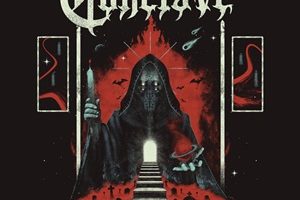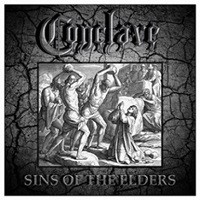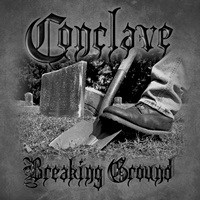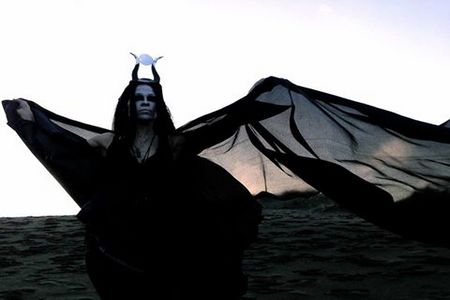Conclave – Fragile Decay
Saturday, 15th May 2021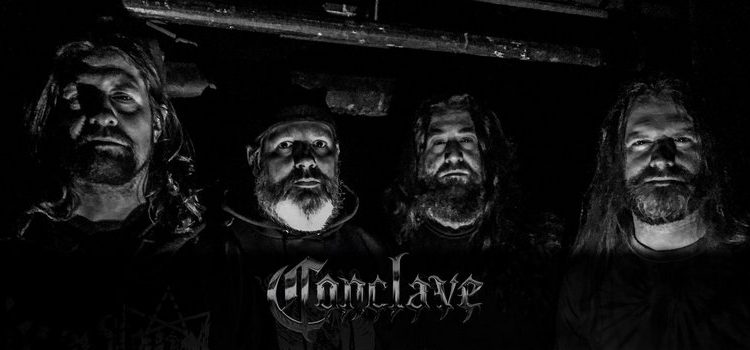
Veterans of the New England heavy music scene with ties to diverse acts like Warhorse and Desolate, Conclave have established themselves as a potent force with their brand of doom/sludge metal. Unafraid to incorporate elements of death, stoner, and classic metal traits into the mix, the group’s second album Dawn of Days hits all the right aural marks in sledgehammer riffing, tempos, and morose vocals – drenched in despair yet hypnotic in their headbanging mechanical ways. We reached out to bassist/vocalist Jerry Orne and guitarist/vocalist Jeremy Kibort to catch us up on the recording of Dawn of Days, the second guitarist change, cover art and its importance with branding the band, favorite live shows over the years, and thoughts on the New England scene.
Dead Rhetoric: Dawn of Days is the latest album for Conclave. Can you tell us about the studio sessions and recording for these songs – and how the deal came about with overseas label Argonauta Records?
Jerry Orne: The recording, we knew we wanted to go up to Blackheart Sound up in Manchester, New Hampshire – we love what Eric (Sauter) has been doing up there. The sounds he gets and everything. What happened was, with the pandemic, we kept getting delayed. New Hampshire backed off on their small business restrictions and we ran up there the very weekend that everything opened back up. We ran up there for the weekend and recorded almost all the tracks in two days, and then we went back up a couple of weeks later to finish up some more of the guitars and vocals. It all went very well, and I’m glad it worked out as quickly as it did because the second wave came soon after and everything closed down again.
Jeremy Kibort: We hit the recording window really, really well. We got things done in a timely fashion. As far as the Argonauta deal, our drummer Dan (Blomquist) shopped this around. He heard back from them really quickly and they really liked (the record). It was a thing where they were trying to acquire more American bands on their label. We stand out from a lot of the bands that he carries. He has great packaging with vinyl and CD’s.
Orne: The word was the style of music we are doing tends to be received a little bit better in Europe. And sure enough, Argonauta stepped forward. We are very happy.
Dead Rhetoric: I have noticed that stylistically, you are a little bit different than what you have on the roster. They feature all kinds of doom, sludge, and stoner styles – but it’s a benefit for them to pick up on US bands as they can approach things differently than the European bands…
Orne: We definitely consider ourselves a metal band. Just in our approach, we don’t take the wizard approach. We are still a bunch of angry metal guys – always have been and always will be.
Dead Rhetoric: Where do you see the major differences between this record and your last full-length from 2016 Sins of the Elders?
Orne: Writing-wise, I would say things are a little more mature.
Kibort: Jerry had a lot of material for the Sins of the Elders album. Dawn of Days is more of my and Chris’ writing. We all have our own writing styles, so the songs have three different approaches. Sound-wise, when we got Chris Giguere on guitar in between the albums, he has a different approach than Terry. Terry was absolutely great on the Sins of the Elders album, but the equipment, the Marshall sound, everything matured between the two albums. That is what you can hear the most on the new album.
Dead Rhetoric: In between albums you had a lineup change with guitarist Chris Giguere joining to replace Terry Savastano. How did you feel about this shift and where do you see the major differences in their playing abilities or outlook for Conclave?
Kibort: Chris has a different style. His sound, he spent a lot of time and a lot of money to come up with his sound for the band. When he joined the band he was using a Peavey half stack, since then he has two different Marshall heads, all Marshall cabinets, and he makes his own guitar effects pedals. One of which I use, and he uses them – the sound has completely changed.
Orne: He custom made a pedal for me too.
Kibort: Terry is a great player, and Chris complements the band in a different way. No two styles are alike. Chris got comfortable very quickly, and we are actively writing stuff now.
Orne: On the Sins album, some of that was older material. We all write which is great, maybe Dan and I wrote one song, Terry wrote one song, or Jeremy wrote one song. But now it’s more of a band effort. Everybody writes – Chris came in not only with his own sound but his own style as far as what he writes and what he plays. Jeremy and Chris are working out a lot of guitar parts, two guitar harmonies. Stuff like that.
Dead Rhetoric: Where did you want to come across lyrically with the new album?
Orne: Honestly. We just wanted to come across honestly. We have some heavy subject matter, and give them the respect that they deserve with the music. Things we are interested in, things we are angry about. A few of the songs, a song like “Suicide Funeral” Jeremy had the idea, the concept, he handed it to me and I wrote the lyrics. “Haggard” the same thing, Jeremy had the idea and the concept, knew what he wanted the song to be about. And the same thing with “Death Blows Cold”, Chris came out with the title and the song, this is what he was thinking and handed it off. We just go that way.
Dead Rhetoric: Was it a conscious decision to keep this album shorter at 45 minutes – because the debut album is much longer?
Orne: Yes and no. I tend to not think in a specific way – I could make every song ten minutes. I don’t think of it in those terms, but Dan and Chris especially just said we have the songs. I wanted to write more songs, but we already had 45 minutes, and that’s a record. We will continue writing for the next record. We hit a point where we had five songs and now is the time. With Sins, there was one song on there that we had intended to put out on a seven inch that never happened, and rather than let the song just die we put it on that album. And we had another song that came together really quickly. With this record we had worked on these songs for a long time – refined them and had them where we liked them.
Dead Rhetoric: Is that why you released the “War Stalks the Land” cassette single to give people material in between the records?
Orne: Yes. When Terry left the band, he gave us plenty of notice and we knew he was leaving. Terry wrote that one almost on the way out the door. We weren’t sure if you put a song on the new record, even if it’s an older song with a different guy. We let that one stand on its own, and it gave us time to integrate Chris into the band. We knew it would take a while before the next record, but with the pandemic we didn’t know how long it was going to be so I’m glad we put out “War…” when we did.
Dead Rhetoric: Tell us about the cover art for this record – and can you discuss in your viewpoint the importance of cover art today compared to how things were growing up when it came to your initial ideas of whether or not to buy a record, solely based sometimes on cover art as you may not have had the chance to preview a record?
Kibort: This would be a better question for Dan to answer as he contacted the artist known as The Rotten Mess – he had done work before on one of our t-shirt designs. He’s a computer designer. The main character in the middle of the album is a character that we created, a motif we had going on. We wanted some dragons around him in the sky, objects glued to the guy’s hands. We went back and forth for a little while and we ended up with something that came out awesome. It has the look of how the songs feel. Dan gave the artist some early rehearsal tracks to know the album we were making. We liked his style and wanted to know what he thought these sounds look like? And that’s what we have.
And as far as the importance of album art now versus the old days, I think it’s about the same. When people download music on their computer, they may not get to see the full picture. As far as looking at an album I still think it’s very important to have something that is eye-catching, stands out from the pack. What we are trying to go with something that is on the album, on the t-shirt, using him like a Conclave thing. Like Megadeth had with Vic Rattlehead, kind of a mascot type of thing.
Orne: Once we realized Argonauta was going to do vinyl, we had the ability to do the cover, the poster, the lyrics, it just gave us the opportunity to do more than just put tracks out there. To really complete the package this time.
Dead Rhetoric: What characteristics shape the songwriting and style of Conclave? Although you have many elements of doom, stoner, and sludge sub-genres within your heavy style, one can also hear aspects of traditional/classic and extreme nuances depending on the needs of the song, would that be fair to say?
Kibort: Absolutely. We come from a big background of metal – death metal, Jerry’s time with Warhorse is the foundation of the sludge, doom stuff back in its infancy. Having a very dynamic sound is something that we wanted to do right from the beginning. With elements of traditional doom, depressing stuff like My Dying Bride, Paradise Lost mixed with a bit of a stoner vibe. Some major notes mixed with some minor notes. Maintaining that … we use active pickups for more of a metal sound, not as fuzzy of a sound as stoner bands may have these days.
Orne: We pull from a lifetime of metal. When you are a kid, just everything we’ve all grown up with. If you hear something you like, it sticks in your brain, whether its Rainbow or Eyehategod or Brutal Truth. It’s with you and a part of you, and when you go to write, that stuff comes out.
Kibort: With “Death Blows Cold” for example, some of the parts had those thrashy riffs, and up-tempo. Towards the end though it has an Eyehategod, Type O Negative kind of vibe to it. The whole song changes all the way through.
Dead Rhetoric: How would you describe the outlook of Conclave in a live club/festival environment versus what you hear on record? And what have been some of your favorite shows to date with the band?
Orne: Live and on record, hopefully it’s the same. We try to record what we sound like live. No studio tricks or anything like that.
Kibort: Favorite shows, I think we’ll go with the current lineup. We got to open for Monolord, a sold- out show at the Middle East. That was definitely one of my favorites. We also did a great show with Conan at Great Scott, some of the video footage from “Haggard” is from that show. We should have played about twenty more shows in the time that we’ve been sitting around.
Orne: One of my favorites was the Stoned to Death festival at the Church in Brattleboro, Vermont. It was an all-day thing and I think Chris’ first show with us, great venue, great sound, great people. We are looking forward to getting back up there and be loud again.
Kibort: It’s a much better vibe playing in a stone church with stained glass windows than in some bar with a dartboard behind you (laughs).
Dead Rhetoric: What are your thoughts on the doom genre and its many numerous branches that have evolved over the last few decades? Would you say things are growing and more popular than ever before, or do you believe there are still cult niches in specific pockets of the US and other countries?
Orne: I think it’s growing and expanding. New bands pop up all the time. Any style – there’s a big thrash resurgence right now, a big old school death metal resurgence. The music is always there, it’s just what happens to grab people’s attention at that moment. We all listen to albums whether they came out this year or forty years ago. It’s all music, you know?
Kibort: The genre has grown and wider in reach. I’m an old school guy, I’m 48 – when I first started listening to doom, it was depressing with death metal vocals. Paradise Lost, My Dying Bride, Cathedral, Autopsy too. Over the years its changed, we will play a doom fest and you have a lot of rocking bands, not really doom as I see it where things are supposed to be sad and depressing. It’s changed and been redefined. You get a lot of good, and a lot of ‘okay – this band sounds like the last band’.
Dead Rhetoric: What do you see as some of the major challenges that Conclave faces at this point in your career? How does the band handle that work, family, music balance – as you also have other band work with Desolate and Benthic Realm for certain members?
Orne: It can be difficult balancing everything. When we were teenagers we practiced three or four nights a week, played shows on the weekends. Now we can’t practice as much as we used to, we still keep it going. Technology helps a little bit, we can work on a riff at home, record it, send it to the other guys and when we walk into practice we are somewhat prepared. We just adapt and keep it going, keep going forward as best as we can.
Kibort: I would basically say the same thing. We aren’t playing as many shows as we’d like, the pandemic certainly hurt things. We all caught COVID at one point which stopped us in our tracks for a little bit. The album is out, the timing is really good. We write at home, have ideas, match up when we can meet up. We maximize our time away as best as we can. There are no shows to get ready for right now. Even when get together sporadically, we are working on new stuff right now.
Dead Rhetoric: Can you discuss the New England heavy music scene and the broad impact that it’s made on you personally? There seems to be a wide array of talent in so many styles, but mutual respect in other genres that maybe doesn’t happen as much in other parts of the US, don’t you think?
Orne: I would agree with that, yes. New England has a great scene. Years back, you could go to Providence, RI and see some of the best death metal shows in the world, regularly. There are so many different bands, in every style. It’s just great. There are so many different bands, so many different styles – especially on a bigger festival. Back when we played Club 490 in Fitchburg, MA, they would book two death metal bands and two hardcore bands together, it was routine. You would be exposed to a kind of music that you wouldn’t hear otherwise. Sometimes it was difficult when we first started, we were in a heavy thrash or death metal band and they would say we are metal, lump us in with some Guns N Roses style band and that wasn’t any fun. Once you get older and you meet some more people, you start to be more involved with booking your own shows and it grows.
Kibort: Between Rhode Island, Massachusetts, and New Hampshire you had a lot of national tours coming through. All different kinds of metal. A lot of venues. When you have that much metal coming through, it inspires people to start their own bands. In the local scene, we have a lot of different sounding bands in a lot of different genres. It’s really healthy. In New England I don’t think you can pin down a specific sound.
One funny story. Cryptopsy came through Ralph’s here in Worcester, and they played with one black metal band from Canada. It was definitely obvious that the crowd didn’t want to come hearing this, they wanted their brutal death metal.
Orne: Twenty years ago, Warhorse opened for Cryptopsy. The silence was deafening in between our songs (laughs). People just hated us. I personally really enjoyed that, it made me play a little louder and slower with more feedback. It was in the Palladium, and there were half a dozen people at the end of the night that liked what we are doing. 99.5% of the people could not wait for us to die (laughs). I enjoy that stuff sometimes.
Dead Rhetoric: What are some of your hobbies, interests, and passions that you like to pursue in your free time away from music when you have the energy to do so?
Orne: For me music is the passion. We are all older, I am married and I have three kids. I drive a truck for a living, and that takes a lot of time. Playing music is my passion and what I do, every minute I can. I enjoy being outside and living.
Kibort: I run my own construction company, but in my free time I have guitars I put together. I build my own guitar cabinets and gear. Two full stacks with Marshall specifications and it’s going to be cool. Doing some custom graphics on it too.
Orne: To speak for the other guys, Dan is very involved with the band. On the artistic side, making everything work. Chris is a gear wizard, he repairs and sets up guitars.
Dead Rhetoric: What’s on the agenda for Conclave and your other band activities in the upcoming year or two?
Orne: We have had a couple of things we turned down, but we are hoping to be back out in July, one outdoor show booked. Hopefully we can do this safely and get back out there by the fall. We will see how things are out there, go back out there and keep going. Desolate, we recently got a new drummer. He’s learning some of the older material and we are working on new material. We are hoping to have our next album out soon, it’s all recorded except for the vocals. And that’s another COVID situation where the studio got shut down for months. We are hoping to have that out by the end of the year as well.
http://www.youtube.com/watch?v=4IQ-TXs2xRc











